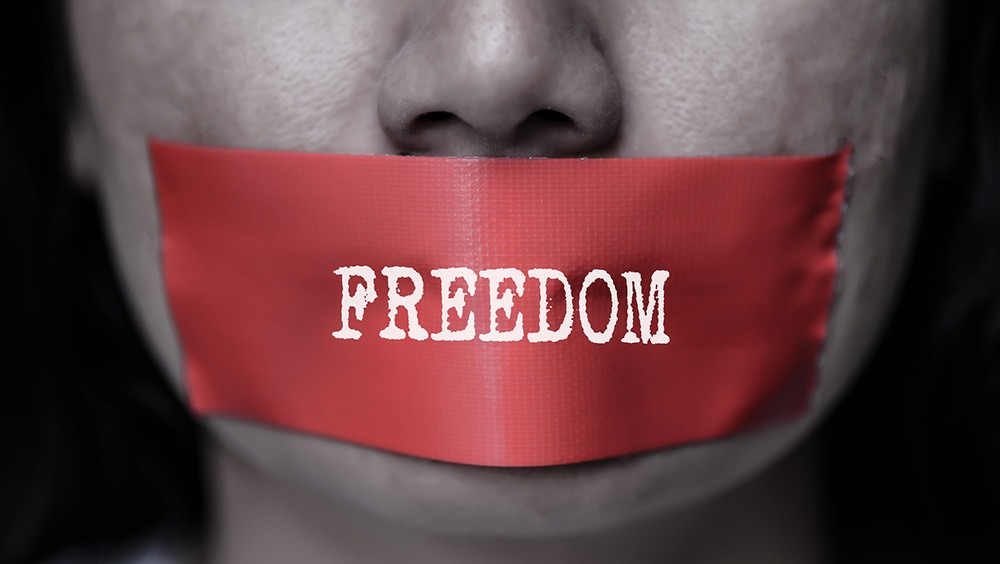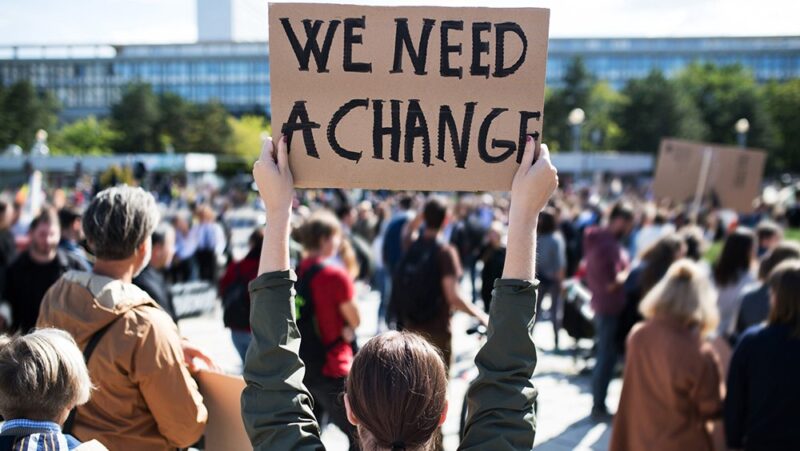Prior Restraint: When (and How) the Government Can Censor You

Government censoring your speech before you say something or censoring news before it is published sits near the top of things that violate the First Amendment. The legal term for this is “prior restraint.”
This form of censorship prevents thoughts and ideas from ever entering public conversation. In the 1500s, the British made printers get licenses as a way to control what was published. By the 1700s, that law was gone – but not forgotten. The Founding Fathers created the First Amendment to make sure this type of prior restraint did not return.
What is prior restraint?
Prior restraint generally restricts speech before it happens, but it goes further than that. It also is when the government requires any review or approval process before the speech or expression occurs.
Simply put: A prior restraint is anytime the government acts as a gatekeeper to free expression.
While most often associated with printed materials, a prior restraint can be imposed on any type of expression. Here are some examples of how it can occur:
- A state law requiring government review and approval of pamphlets, fliers or posted signs before they are distributed.
- A city ordinance requiring a permit to speak in public or organize a protest.
- A judge’s order (or “injunction”) preventing publication of a news article.
- Requiring a license to publish a book, newspaper or magazine.
Why prior restraint violates the First Amendment
The First Amendment sets a very high bar for limiting speech. The government must demonstrate that a law, regulation or punishment directed at a person’s speech must directly prevent a specific harm. The government must allow all non-harmful speech.
Take defamation – speech that damages a reputation – as an example. To win a defamation lawsuit, the person who feels they have been wronged must prove several things:
- That the speaker made a substantially false assertion of fact (as opposed to stating an opinion) that harmed the reputation of the person they were speaking about in a way that caused actual financial damage;
- And that the speaker’s error was negligent (or, in cases regarding a public official or figure, reckless or deliberate) because they didn’t take reasonable steps to ensure they were getting it right.
This sets a high bar that is designed to ensure that journalists – or anyone speaking about matters of public concern – can speak freely without fear of being punished. It recognizes that someone who feels that they have been wronged should use their own speech to set the record straight. It also ensures the government stays out of the debate over what is true and what is false unless there is a serious need for intervention. That is, only when there is a serious misstatement of fact that actually harms someone.
This is one of the cornerstones of the First Amendment, the so-called “marketplace of ideas” as Supreme Court Justice Oliver Wendell Holmes described: “The best test of truth is the power of the thought to get itself accepted in the competition of the market.” A prior restraint is exactly the opposite, giving the government too much power to prevent ideas from being heard, considered, debated or accepted. We never even get to hear the idea and judge for ourselves.
Prior restraints are particularly dangerous because they are often imposed on people who are trying to speak about matters of public concern. Protesters who are assembling or petitioning to demand a change to government policies. Journalists who write stories about the actions of government officials. Yet those same government officials have the power to censor that speech entirely.
When prior restraint may be OK
First Amendment law clearly disapproves of prior restraint – including review (where the government must review and approve speech before it occurs). Prior restraint is only allowed in limited circumstances involving:
- Speech that is of low value, such as obscenity.
- Speakers who have less First Amendment protection, like public school students working on a school-sponsored publication.
- Speech that could cause irreversible harm where no after-the-fact punishment offers protection.
Some examples include:
- Obscenity. As a “low value” category of speech with no First Amendment protection, prior restraint of obscene books, magazines and movies has been upheld. However, courts have demanded strict procedures be followed in this review process to ensure that the reviewing body – often required to be a judge – quickly determines that the content in question meets the very strict definition of obscenity from the 1973 Supreme Court case of Miller v. California. The publisher or movie producer must also get to appeal this decision.
- Speech in school-sponsored publications. The Supreme Court, in the 1988 case of Hazelwood School District v. Kuhlmeier, said that public school officials have the right to review articles in the school’s student-run newspaper before they are published and could censor content for any legitimate educational purpose.
- Threats to national security. The government has a compelling interest in protecting national security. There is often no margin for error when lives are on the line. But hypothetical threats to national security are not enough to justify a prior restraint. Courts have said that the government needs to prove a direct and immediate danger to national security or similar likelihood that publication would result in loss of life.
- Gag orders. Courts may order parties not to speak publicly about a trial and in some cases, may restrict disclosing documents related to an ongoing case because of concerns regarding the fairness of a trial or the possibility of threats to courtroom staff, parties to the case and witnesses.
- Requiring permits for protests. Requiring protest organizers to get a permit before assembling in public spaces is a prior review – and technically a prior restraint – but it is allowed under the First Amendment as long as the standards for approving or denying the permit are objective and relate only to the time, place and manner (the when, where and how) of the protest as opposed to the cause involved or the planned speech.
Examples of prior restraint
Even though prior restraints run afoul of the First Amendment, several attempts have been made to impose them on news media and other speakers over the years. Some have even been successful.
The first major Supreme Court case involving a prior restraint was Near v. Minnesota (1931). Minnesota had a law that barred the publication of malicious or defamatory materials. A county prosecutor convinced a judge to issue a gag order against two journalists from a paper called the Saturday Press after they wrote several articles accusing that prosecutor and other politicians of doing business with gangsters. The Supreme Court ruled for the paper and overturned the gag order, calling the prior restraint “the essence of censorship.” The court left the door open to prior restraint in “exceptional cases” citing wartime and incitement to violence as potential examples.
Many prior restraint cases involved Jehovah’s Witnesses. Most were struck down. These included:
- Lovell v. City of Griffin (1938): A Georgia law required prior permission from the city manager to hand out pamphlets.
- Murdock v. Pennsylvania (1943): A law required a license to go door-to-door to sell religious material.
- Jones v. Opelika (1942): A law required a license to sell books.
- Niemotko v. Maryland (1951): A law required a permit to meet in city parks.
In Bantam Books Inc. v. Sullivan (1963), the Supreme Court ruled in favor of a group of book publishers who sued a Rhode Island state commission on juvenile delinquency. The commission told the publishers and others that certain books and magazines had been deemed “objectionable” for sale to anyone under 18. These included some pornographic magazines but also some horror comic books as well as more mainstream fare like “Peyton Place.” It also requested the cooperation of those publishers, noting that a list of all “objectionable” books had been given to local police departments with a recommendation that any distribution to someone under 18 be punished under state obscenity laws. The court held that these threats of criminal charges were a method of “informal censorship” that violated the First Amendment.
The most famous attempt at a prior restraint is the 1971 case of New York Times Co. v. United States, better known as the Pentagon Papers case. A multi-volume classified document titled “History of U. S. Decision-Making Process on Viet Nam Policy” was stolen from a private company and given to The New York Times and The Washington Post. Both papers began publishing excerpts. The government immediately sued to stop publication, arguing that it would threaten national security because other governments would not trust us with their secrets. The court ruled in favor of the newspapers despite the asserted national security threat. It held that there needs to be a direct and immediate danger to the country.
In Nebraska Press Association v. Stuart (1976), a Nebraska trial judge was concerned that media coverage of a sensational murder trial in a small town would prevent a fair trial. The judge issued a gag order prohibiting all participants in the case from speaking to the media. The Supreme Court struck down this gag order because there was no “clear and present danger” that stopped a fair trial from happening. It also identified other methods to accomplish that goal short of a broad prohibition on speech.
An order against publication was upheld in the 1979 case of United States v. Progressive Inc. The government sought and received an injunction blocking publication of an article titled “The H-bomb secret: How we got it — why we’re telling it” that would teach anyone to make a nuclear bomb. The story was later published outside the United States, at which point the injunction was canceled.
Another order was upheld in 2002 in Thomas v. Chicago Park District. A city park ordinance requiring a permit before holding mass events was upheld as a legal “time, place, and manner restriction.” The ordinance was allowed because those reviewing permit applications and making decisions were given strict objective standards to follow and all decisions were immediately appealable.
Prior restraint, press freedom and your right to know
Famed First Amendment scholar Alexander Bickel once explained the danger to free speech that prior restraint presents: “A criminal statute chills; prior restraint freezes.”
In other words, if the possibility of punishment might discourage someone from expressing themselves, a prior restraint prevents that expression from occurring at all.
The First Amendment was a response to this extreme censorship used by the British Crown. Courts have ensured it does not happen in the United States, except in very extreme cases. Instead, we rely on specific punishments that consider what was said and any actual harm from speech. These guidelines let most protected speech continue to flourish.
News Executives Share the Fight to Bring Imprisoned Journalists Home
Can You Protest on Public Property? The First Amendment Guide
Related Content
$30,000 Giving Challenge
Support the Freedom Forum’s First Amendment mission by Dec 31st and double your impact.

